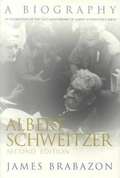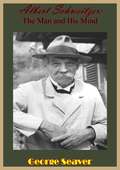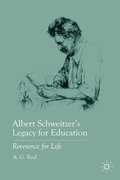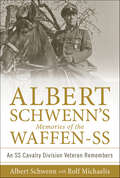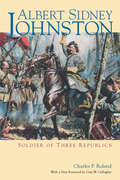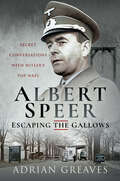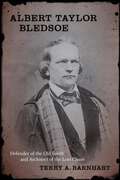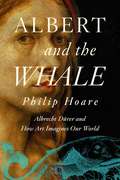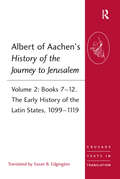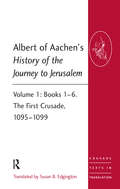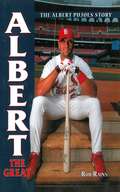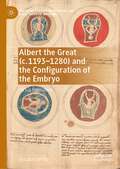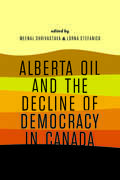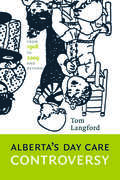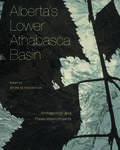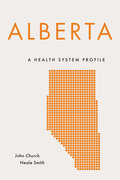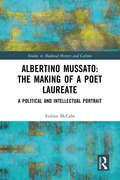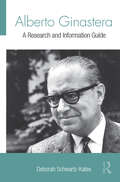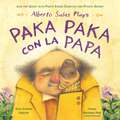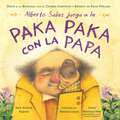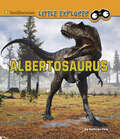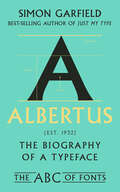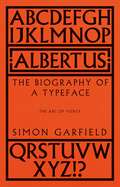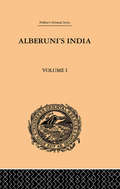- Table View
- List View
Albert Schweitzer: A Biography
by James BrabazonJames Brabazon updates his critically acclaimed biography of humanitarian Albert Schweitzer to include a wealth of recently discovered documents, including the letters between Schweitzer and Helene Bresslau written during the ten years before their marriage. Brabazon's research has also included recently released documents from the State Department regarding Schweitzer's battle with the United States Atomic Energy Commission to halt H-bomb tests.
Albert Schweitzer: The Man and His Mind [5th Revised Edition]
by George SeaverThe definitive biography of one of the titans of our time, together with a full appreciation of his revolutionary thought and writings, is now revised to include new materials on the eighth decade of Dr. Schweitzer's life and work at Lambaréné.The book tells two exciting stories: the outward events of Schweitzer's life--his childhood in Alsace, his career in Strasbourg, his organ studies and recitals, his decision to become a medical missionary in Africa, and his long labors there; and a review of his great intellectual and spiritual contributions--his upsetting of Biblical criticism, his profound insights into Christ, St. Paul, Bach and Goethe, his philosophy of civilization and reverence for life."Seaver's book is without equal in opening to us simply and clearly a view of the life and mind of Schweitzer of Lambaréné, Africa, Europe and the World."--Christian Century"Mark this down as a great biography of a man whom many regard as our greatest living contemporary."--Living Church"Step by step Seaver leads the reader to look at life with Schweitzer, in order to understand his attitude toward Greek eudaemonism, Kant, Schopenhauer, Nietzsche, and finally the building up of his affirmation [Reverence for Life]...Those of us who seek to understand the meaning of Schweitzer's life and thought and 'realized fellowship with the living Christ's must master this tiny book, so filled with spiritual reality."--EDWARD H. HUME"Dr. Seaver's excellent work should appeal not only to Schweitzer's many admires, but to those anxious to find a way out of the baffling labyrinth of current world conditions."--Christian Century"This swift yet fundamental survey of one whole trend in the intellectual life of man is a remarkable piece of work. It proves that Schweitzer is one of the great thinkers of our time."--JOHN HAYNES HOLMES
Albert Schweitzer’s Legacy for Education
by A. G. RudThis is the first book devoted to the study of the thought of Albert Schweitzer as it relates to educational theory and practice. Rud argues that Schweitzer's life and work offer inspiration and timely insights for both educational thought and practice in our new century.
Albert Schwenn's Memories of the Waffen-SS: An SS Cavalry Division Veteran Remembers
by Rolf Michaelis Albert SchwennA firsthand account from a member of the SS Cavalry Division, and SS Cavalry Training and Replacement Battalion
Albert Sidney Johnston: Soldier of Three Republics
by Charles P. RolandA biography of the man whom Jefferson Davis could have considered one of his greatest generals during the American Civil War. A revised edition of the only full-scale biography of the Confederacy&’s top-ranking field general during the opening campaigns of the Civil War. Albert Sidney Johnston was selected as one of the best one hundred books ever written on the Civil War by Civil War Times Illustrated in 1981 and by Civil War: The Magazine of the Civil War Society in 1995.Featuring a new forward by Gary W. Gallagher and a new preface by the author Praise for Albert Sidney Johnston &“A biography of the Kentucky native who might have been mentioned in the same breath as Robert E. Lee had Johnston not died while commanding Confederate troops at the battle of Shiloh in 1862, only a year after the war started.&”—Lexington Herald-Leader &“Johnston&’s early years, military career, and encounters with Indians, Mormons, and Union soldiers are the focus of this &“masterly&” study.&”—Civil War Book Review &“The view of army life and the terrible decisions that many southern officers had to make at the beginning will provide an excellent background for further understanding the Civil War.&”—Paper Wars
Albert Speer—Escaping the Gallows: Secret Conversations with Hitler's Top Nazi
by Adrian GreavesAt the Nuremberg War Crimes Tribunal, Albert Speer, Hitler’s one-time number two, persuaded the judges that he ‘knew nothing’ of the Holocaust and related atrocities. Narrowly escaping execution, he was sentenced to twenty years in Spandau Prison, Berlin. In 1961, the newly commissioned author, as the British Army Spandau Guard Commander, was befriended by Speer, who taught him German. Adrian Greaves’ record of his conversations with Speer over a three year period make for fascinating reading. While the top Nazi admitted to Greaves his secret part in war crimes, after his 1966 release he determinedly denied any wrongdoing and became an intriguing and popular figure at home and abroad. Following Speer’s death in 1981 evidence emerged of his complicity in Hitler’s and the Nazi’s atrocities. In this uniquely revealing book the author skilfully blends his own personal experiences and relationship with Speer with a succinct history of the Nazi movement and the horrors of the 1930s and 1940s. In so doing new light is thrown on the character of one of the 20th century’s most notorious characters.
Albert Taylor Bledsoe: Defender of the Old South and Architect of the Lost Cause (Southern Biography Series)
by Terry A. BarnhartAlbert Taylor Bledsoe (1809--1877), a principal architect of the South's "Lost Cause" mythology, remains one of the Civil War generation's most controversial intellectuals. In Albert Taylor Bledsoe: Defender of the Old South and Architect of the Lost Cause, Terry A. Barnhart sheds new light on this provocative figure.Bledsoe gained a respectable reputation in the 1840s and 1850s as a metaphysician and speculative theologian. His two major works, An Examination of President Edwards' Inquiry into the Freedom of the Will (1845) and A Theodicy; Or, Vindication of the Divine Glory, As Manifested in the Constitution and Government of the Moral World (1853), grapple with perplexing problems connected with causality, Christian theology, and moral philosophy. His fervent defense of slavery and the constitutional right of secession, however, solidified Bledsoe as one of the chief proponents of the idea of the Old South. In An Essay on Liberty and Slavery (1856), he assailed egalitarianism and promoted the institution of slavery as a positive good. A decade later, he continued to devote himself to fashioning the "Lost Cause" narrative as the editor and proprietor of the Southern Review from 1867 until his death in 1877. He carried on a literary tradition aimed to reconcile white southerners to what he and they viewed as the indignity of their defeat by sanctifying their lost cause. Those who fought for the Confederacy, he argued, were not traitors but honorable men who sacrificed for noble reasons.This biography skillfully weaves Bledsoe's extraordinary life history into a narrative that illustrates the events that shaped his opinions and influenced his writings. Barnhart demonstrates how Bledsoe still speaks directly, and sometimes eloquently, to the core issues that divided the nation in the 1860s and continue to haunt it today.
Albert and the Whale: Albrecht Dürer and How Art Imagines Our World
by Philip HoareAn illuminating exploration of the intersection between life, art and the sea from the award-winning author of The Whale.In 1520, Albrecht Dürer, the most celebrated artist in Northern Europe, sailed to Zeeland to see a whale. A central figure of the Renaissance, no one had painted or drawn the world like him. Dürer drew hares and rhinoceroses in the way he painted saints and madonnas. The wing of a bird or the wing of an angel; a spider crab or a bursting star like the augury of a black hole, in Dürer's art, they were part of a connected world. Everything had meaning. But now he was in crisis. He had lost his patron, the Holy Roman Emperor. He was moorless and filled with wanderlust. In the shape of the whale, he saw his final ambition. Dürer was the first artist to truly employ the power of reproduction. He reinvented the way people looked at, and understood, art. He painted signs and wonders; comets, devils, horses, nudes, dogs, and blades of grass so accurately that even today they seem hyper-real, utterly modern images. Most startling and most modern of all, he painted himself, at every stage of his life. But his art captured more than the physical world, he also captured states of mind. Albert and the Whale explores the work of this remarkable man through a personal lens. Drawing on Philip&’s experience of the natural world, and of the elements that shape our contemporary lives, from suburbia to the wide open sea, Philip will enter Dürer's time machine. Seeking his own Leviathan, Hoare help us better understand the interplay between art and our world in this sublimely seductive book.
Albert of Aachen's History of the Journey to Jerusalem: Books 7-12. The Early History of the Latin States, 1099-1119
by Susan B. EdgingtonAlbert of Aachen’s History of the Journey to Jerusalem presents the story of the First Crusade (1095-1099) and the first generation of Latin settlers in the Levant (1099-1119). Volume 2, The Early History of the Latin States, provides a surprising level of detail about the reign of King Baldwin I (1100-1118), especially its earlier years and the crusading expeditions of 1101. It offers much more information than the only other substantial Latin account of the same events, by Fulcher of Chartres, and where it can be tested against other narratives, including Arabic and Greek sources, it proves to be worthy of both trust and respect. Susan B. Edgington’s English translation has been widely praised, following its first publication in the Oxford Medieval Texts series, and is here presented with a new introduction and updated notes and bibliography.
Albert of Aachen's History of the Journey to Jerusalem: Volume 1: Books 1–6. The First Crusade, 1095–1099 (Crusade Texts in Translation)
by Albert Of AachenAlbert of Aachen’s History of the Journey to Jerusalem presents the story of the First Crusade (1095-1099) and the early history of the crusader states (1099-1119). Volume 1, The First Crusade, is a long and richly detailed account of events well known from the reports of participants, such as Fulcher of Chartres, Raymond of Aguilers and the anonymous author of the Gesta Francorum, but told from a strikingly different perspective. Albert did not go on crusade himself, but gathered reports and anecdotes from those who did, and wove them into narrative that foregrounds the activities of Peter the Hermit, Godfrey of Bouillon, Baldwin of Boulogne, and their followers. His History therefore offers a counter-balance, and sometimes a corrective, to the established view. Susan B. Edgington’s English translation has been widely praised, following its first publication in the Oxford Medieval Texts series, and is here presented with a new introduction and updated notes and bibliography.
Albert the Great: The Albert Pujols Story
by Rob RainsAlbert the Great: The Albert Pujol's Story is a book that describes how Pujols moved from the Dominican Republic when he was just 15 years old and worked hard in the US to fulfill his dream of becoming one of the best players in Baseball today. Take a look at how this down-to-earth and motivated player has quickly won the respect and admiration of not only Cardinals fans, but also Baseball fans around the country.
Albert the Great: Virtus Formativa (Palgrave Studies in Medieval and Early Modern Medicine)
by Amalia CerritoThis book provides the first comprehensive treatment of Albert the Great’s (c. 1193–1280) notion of virtus formativa, a shaping force responsible for crucial dynamics in the formation of living beings. Crossing the boundaries between theology and philosophy, the notion of virtus formativa, or formative power, was central in explaining genetic inheritance and the configuration of the embryo. By adopting an interdisciplinary approach, this book reconstructs how Albert the Great, motivated by theological open issues, reorganised the natural-philosophical and medical theories on embryonic development, creatively drawing upon Greek, Patristic, and Arabic sources. A valuable contribution to research, this book offers essential insights for those studying the history of embryology, medicine, and science in the medieval and renaissance periods.
Alberta Oil and the Decline of Democracy in Canada
by Paul Kellogg Bob Barnetson Gabrielle Slowey Jason Foster Josh Evans Joy Fraser Karen Wall Lorna Stefanick Manijeh Mannani Meenal Shrivastava Peter Jay Smith Ricardo Acuna Sara Dorow Trevor HarrisonPrior to May 2015, the oil-rich jurisdiction of Alberta had, for over four decades, been a one-party state. During that time, the rule of the Progressive Conservatives essentially went unchallenged, with critiques of government policy falling on deaf ears and Alberta ranking behind other provinces in voter turnout. Given the province’s economic reliance on oil revenues, a symbiotic relationship also developed between government and the oil industry. Cross-national studies have detected a correlation between oil-dependent economies and authoritarian rule, a pattern particularly evident in Africa and the Middle East. Alberta Oil and the Decline of Democracy in Canada sets out to test the “oil inhibits democracy” hypothesis in the context of an industrialized nation in the Global North. In probing the impact of Alberta’s powerful oil lobby on the health of democracy in the province, contributors to the volume engage with an ongoing discussion of the erosion of political liberalism in the West. In addition to examining energy policy and issues of government accountability in Alberta, they explore the ramifications of oil dependence in areas such as Aboriginal rights, environmental policy, labour law, women’s equity, urban social policy, and the arts. If, as they argue, reliance on oil has weakened democratic structures in Alberta, then what of Canada as whole, where the short-term priorities of the oil industry continue to shape federal policy? In Alberta, the New Democratic Party is in a position to reverse the democratic deficit that is presently fuelling political and economic inequality. The findings in this book suggest that, to revitalize democracy, provincial and federal leaders alike must find the courage to curb the influence of the oil industry on governance.
Alberta's Day Care Controversy: From 1908 to 2009 and Beyond
by Tom LangfordDay care in Alberta has had a remarkably durable history as a controversial issue. Since the late 1950s, disputes over day care programs, policies, and funding have been a recurring feature of political life in the province. Alberta’s Day Care Controversy traces the development of day care policies and programs in Alberta, with particular emphasis on policy decisions and program initiatives that have provoked considerable debate and struggle among citizens. For most of Alberta’s first fifty years as a province, day care was treated as a private rather than a public issue. Beginning in the late 1950s, however, debates about day care began to appear regularly on the public record. Dr. Tom Langford brings to light the public controversies that occurred during the last four decades of the twentieth century and the first decade of the new millennium, placing contemporary issues in historical context and anticipating the elements of future policy struggles.
Alberta's Lower Athabasca Basin: Archaeology and Palaeoenvironments
by John W. Ives Alwynne B. Beaudoin Angela M. Younie Brian M. Ronaghan Brian O. Reeves Duane G. Froese Elizabeth C. Robertson Eugene M. Gryba Gloria J. Fedirchuk Grant M. Clarke James A. Burns Janet Blakey Jennifer C. Tischer Laura Roskowski Luc Bouchet Murray Lobb Nancy Saxberg Raymond J. Le Blanc Robert R. Young Robin J. Woywitka Stephen A. Wolfe Thomas V. Lowell Timothy G. FisherOver the past two decades, the oil sands region of northeastern Alberta has been the site of unprecedented levels of development. Alberta's Lower Athabasca Basin tells a fascinating story of how a catastrophic ice age flood left behind a unique landscape in the Lower Athabasca Basin, one that made deposits of bitumen available for surface mining. Less well known is the discovery that this flood also produced an environment that supported perhaps the most intensive use of boreal forest resources by prehistoric Native people yet recognized in Canada. Studies undertaken to meet the conservation requirements of the Alberta Historical Resources Act have yielded a rich and varied record of prehistoric habitation and activity in the oil sands area. Evidence from between 9,500 and 5,000 years ago—the result of several major excavations—has confirmed extensive human use of the region’s resources, while important contextual information provided by key geological and palaeoenvironmental studies has deepened our understanding of how the region’s early inhabitants interacted with the landscape. Touching on various elements of this rich environmental and archaeological record, the contributors to this volume use the evidence gained through research and compliance studies to offer new insights into human and natural history. They also examine the challenges of managing this irreplaceable heritage resource in the face of ongoing development. Contributors: Alwynne Beaudoin, Angela Younie, Brian O.K. Reeves, Duane Froese, Elizabeth Roberston, Eugene Gryba, Gloria Fedirchuk, Grant Clarke, John W. Ives, Janet Blakey, Jennifer Tischer, Jim Burns, Laura Roskowski, Luc Bouchet, Murray Lobb, Nancy Saxberg, Raymond LeBlanc, Robert R. Young, Robin Woywitka, Thomas V. Lowell, and Timothy Fisher
Alberta: A Health System Profile (Provincial and Territorial Health System Profiles)
by John Church Neale SmithAlberta: A Health System Profile provides the first detailed description of Alberta’s health care system and the underpinning political and social forces that have shaped it. Drawing on significant wealth from government revenues generated through the energy sector, Alberta has been able to develop an extensive public health and health care infrastructure. Alberta has used its financial resources to attract health professionals by offering the highest levels of financial compensation in Canada. However, although it spends more per capita than other Canadian jurisdictions, Alberta’s health care system costs and health outcomes are mediocre compared to those of many other Canadian jurisdictions. This unexpected outcome is the consequence of the unique interplay of economic and political forces within Alberta’s political economy. Through an examination of Alberta’s political and economic history, and using research on the structures and services provided, Alberta: A Health Systems Profile provides a detailed description of the programs and services that constitute Alberta’s health care system.
Albertino Mussato: A Political and Intellectual Portrait (Studies in Medieval History and Culture)
by Aislinn McCabeThis book examines the life and political career of Albertino Mussato (1261–1329), a Paduan poet, historian and politician. Mussato was one of the first writers of the late medieval period to begin reviving classical Latin in his works. His classical style tragic drama Ecerinis, inspired by the writings of Seneca, paved the way for him to be crowned as the first poet laureate since antiquity. This work outlines how Mussato depicted the course of his own career, from being an impoverished teenager of insignificant birth to becoming a celebrated poet and scholar, as well as an influential political figure. It looks specifically at the years leading up to Mussato’s public coronation, on 3rd December 1315, as poet laureate for his city. His writings are a key component of his political manoeuvres as he tried to navigate through the troubled waters of northern Italian politics. The book demonstrates how the sources pertaining to Mussato’s life and career are part of an exercise in self-promotion and self-fashioning, intended to secure his position within factional politics, but rooted in a philosophical approach derived from his early classical studies. Accordingly, this book acts as a fully-fledged account of the interaction between Mussato’s writings and his political career, and how this contributed to his rise to fame.
Alberto Ginastera: A Research and Information Guide (Routledge Music Bibliographies)
by Deborah Schwartz-KatesAlberto Ginastera: A Research and Information Guide is the first bio-bibliographic study of the composer and the only published book on the subject in English. This work fills a critical gap in contemporary music studies by enriching our knowledge of one of the most compelling creative voices of the Americas. Given the lack of prior systematic attention to Ginastera, this book establishes a firm foundation for future scholarship. It includes a detailed biographical sketch of the composer that quotes extensively from his letters. It summarizes the defining features of his style and encompasses his infrequently explored late works. It offers the most comprehensive catalogue of Ginastera’s music to date and provides an annotated list of his published writings. This book contains over 400 annotated bibliographic entries that refer to critically selected sources in English, Spanish, French, German, and Italian. The last chapter offers new information about archival holdings and internet resources that facilitates research on this composer. An appendix featuring a detailed chronology of Ginastera’s career completes this work.
Alberto Salas Plays Paka Paka con la Papa: Join the Quest with Peru's Famed Scientist and Potato Expert
by Sara Andrea FajardoWhat can a potato do? To Peruvian scientist Alberto Salas, they have the power to change the world. Go on the hunt with Alberto for for wild potatoes before they go extinct in this playful picture book biography, gorgeously illustrated by Caldecott-honoree Juana Martinez-Neal.High up in the Andes mountains of Peru, agricultural scientist Alberto Salas is on a quest. A quest... for potatoes.Up and down the Andes mountains he goes, playing an epic game of paka paka con la papa, potato hide and seek. These potatoes are special: they have the power to feed the world. Alberto doesn't have a second to waste. The climate is changing and Alberto must find each and every one to save them before they go extinct.The game is on!Alberto races and peers and prods. Drives and trods and climbs. Will he find the potato he seeks? Will he win the game of paka paka con la papa?Author Sara Andrea Fajardo’s spirited biography about “the godfather of potatoes” is paired with lush art by Caldecott-honoree Juana Martinez-Neal to capture how celebrated scientist Alberto Salas brings joy, curiosity, and fun to his very important, life-changing work.
Alberto Salas juega a la paka paka con la papa [Spanish edition]: Únete a la búsqueda con el célebre científico y experto en papas peruano
by Sara Andrea FajardoEsta biografía ilustrada y oda a la conservación y ciencia acompaña al agrónomo peruano Alberto Salas en su búsqueda de papas silvestres antes de que se extingan, con ilustraciones de la ganadora de un Caldecott Honor, Juana Martínez-Neal. Muy alto en la cordillera de los Andes en Perú, el ingeniero agrícola Alberto Salas anda en una búsqueda. En búsqueda… de papas.Arriba y abajo de las montañas va, jugando un juego épico de paka paka con la papa, a las escondidas con la papa. Estos tubérculos son especiales: tienen el poder de alimentar y salvar al mundo.Alberto no tiene tiempo que perder. El clima está cambiando en los Andes y él debe encontrar y rescatar cada una de las variedades de papa antes de que se extingan.¡El juego ya empezó!Alberto corre, busca detenidamente y escarba. Maneja y camina y trepa. ¿Encontrará la papa que busca? ¿Podrá ganar este juego de paka paka con la papa?En su debut como autora con esta energética biografía sobre el “padrino de las papas”, Sara A. Fajardo une fuerzas con el rico y lúdico arte de la ilustradora galardonada con el premio Caldecott, Juana Martinez Neal, capturando cómo el celebrado agrónomo Alberto Salas realiza su imprescindible trabajo con deleite, curiosidad y regocijo.
Albertosaurus (Little Paleontologist Ser.)
by Kathryn ClayAlbertosaurus' name may not sound very fearsome, but this was one deadly dino. Readers learn about this prehistoric predator from engaging text and bold illustrations reviewed by Smithsonian experts.
Albertus: The Biography of a Typeface (The ABC of Fonts Series #0)
by Simon GarfieldA compact and charming history of the beloved handcrafted font by the New York Times best-selling author of Just My Type. Albertus, first carved on a bronze tablet in the 1930s by German Jewish refugee Berthold Wolpe, has proved to be one of the most enduring handcrafted typefaces in the world. It is at once modern and timeless, authoritative and whimsical—renowned as the typeface of London Street signs, David Bowie albums, and Star Wars movie posters. In this unique celebration, best-selling author Simon Garfield charts the story of the creation of Albertus, its innumerable and vibrant uses, and the erratic brilliance of its designer, as recounted by Wolpe’s children. Through his exploration of this singular font, Garfield grapples with one of the most fundamental artistic questions: what makes great art not only survive but flourish in each new age and medium?
Albertus: The Biography of a Typeface (The ABC of Fonts) (The ABC of Fonts)
by Simon GarfieldOne of the most beautiful handcrafted typefaces in the world, Albertus is also one of the most enduring. The face of thousands of book jackets, and the chosen look for David Bowie, Coldplay, Star Wars and London street signs, Albertus is as as warmly enticing on film posters as it is on memorial plaques.The story of the font is one displacement (its designer Berthold Wolpe was a German Jewish refugee who went on to design the masthead for The Times), but also one of permanence, for it has proved a fresh, vibrant and indestructible face for almost a century. In this unique celebration, the designer's children reveal the history of its creation and the erratic brilliance of their father, while the book grapples with one of the fundamental artistic questions: what makes great art not only survive but flourish in each new age and medium?
Albert’s Way: The First North American Congress on the Carmelite Rule
by Michael MulhallThe book deals with the Carmelites who represented one offshoot of the rich, fervent and creative society that formed Europe's medieval--from about 1100 until 1500--and particularly Norman, society.
Alberuni's India: An Account of the Religion, Philosophy, Literature, Geography, Chronology, Astronomy, Customs, Laws and Astrology of India: Volume I
by Edward C. SachauThis is Volume IX of eleven in a collection of India: History, Economy and Society. Originally published in 1910, this is the first part of an account of the religion, philosophy, literature, geography, chronology, astronomy, customs, laws and astrology of Alberuni's India about A.D. 1030.
